Related Research Articles

A fanzine is a non-professional and non-official publication produced by enthusiasts of a particular cultural phenomenon for the pleasure of others who share their interest. The term was coined in an October 1940 science fiction fanzine by Russ Chauvenet and first popularized within science fiction fandom, and from there the term was adopted by other communities.
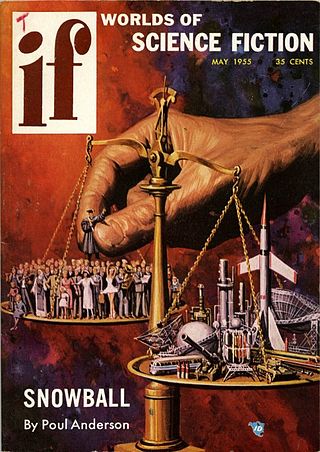
If was an American science fiction magazine launched in March 1952 by Quinn Publications, owned by James L. Quinn.

The Encyclopedia of Science Fiction (SFE) is an English language reference work on science fiction, first published in 1979. It has won the Hugo, Locus and British SF Awards. Two print editions appeared in 1979 and 1993. A third, continuously revised, edition was published online from 2011; a change of web host was announced as the launch of a fourth edition in 2021.

The Magazine of Fantasy & Science Fiction is a U.S. fantasy and science-fiction magazine, first published in 1949 by Mystery House, a subsidiary of Lawrence Spivak's Mercury Press. Editors Anthony Boucher and J. Francis McComas had approached Spivak in the mid-1940s about creating a fantasy companion to Spivak's existing mystery title, Ellery Queen's Mystery Magazine. The first issue was titled The Magazine of Fantasy, but the decision was quickly made to include science fiction as well as fantasy, and the title was changed correspondingly with the second issue. F&SF was quite different in presentation from the existing science-fiction magazines of the day, most of which were in pulp format: it had no interior illustrations, no letter column, and text in a single-column format, which in the opinion of science-fiction historian Mike Ashley "set F&SF apart, giving it the air and authority of a superior magazine".

David Rowland Langford is a British author, editor, and critic, largely active within the science fiction field. He publishes the science-fiction fanzine and newsletter Ansible and holds the all-time record for most Hugo Awards, with a total of 29 wins.

Science Fantasy, which also appeared under the titles Impulse and SF Impulse, was a British fantasy and science fiction magazine, launched in 1950 by Nova Publications as a companion to Nova's New Worlds. Walter Gillings was editor for the first two issues, and was then replaced by John Carnell, the editor of New Worlds, as a cost-saving measure. Carnell edited both magazines until Nova went out of business in early 1964. The titles were acquired by Roberts & Vinter, who hired Kyril Bonfiglioli to edit Science Fantasy; Bonfiglioli changed the title to Impulse in early 1966, but the new title led to confusion with the distributors and sales fell, though the magazine remained profitable. The title was changed again to SF Impulse for the last few issues. Science Fantasy ceased publication the following year, when Roberts & Vinter came under financial pressure after their printer went bankrupt.
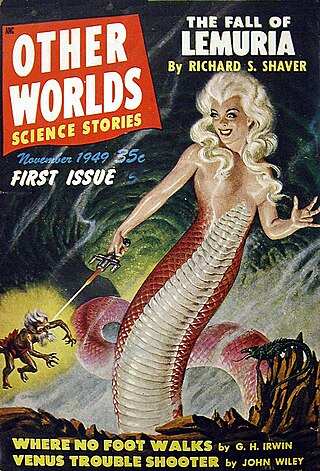
Other Worlds, Universe Science Fiction, and Science Stories were three related US magazines edited by Raymond A. Palmer. Other Worlds was launched in November 1949 by Palmer's Clark Publications and lasted for four years in its first run, with well-received stories such as "Enchanted Village" by A. E. van Vogt and "Way in the Middle of the Air", one of Ray Bradbury's "Martian Chronicle" stories. Since Palmer was both publisher and editor, he was free to follow his own editorial policy, and presented a wide array of science fiction.

John Brian Francis "Jack" Gaughan, pronounced like 'gone', was an American science fiction artist and illustrator and multiple winner of the Hugo Award in the category of Best Professional Artist.

Patrick James Nielsen Hayden, is an American science fiction editor, fan, fanzine publisher, essayist, reviewer, anthologist, teacher and blogger. He is a World Fantasy Award and Hugo Award winner, and is an editor and the Manager of Science Fiction at Tor Books.
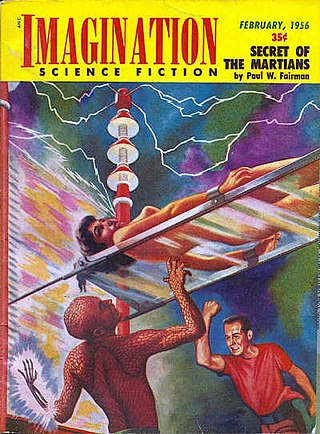
A science fiction magazine is a publication that offers primarily science fiction, either in a hard-copy periodical format or on the Internet. Science fiction magazines traditionally featured speculative fiction in short story, novelette, novella or novel form, a format that continues into the present day. Many also contain editorials, book reviews or articles, and some also include stories in the fantasy and horror genres.
Locus: The Magazine of The Science Fiction & Fantasy Field, founded in 1968, is an American magazine published monthly in Oakland, California. It is the news organ and trade journal for the English-language science fiction and fantasy fields. It also publishes comprehensive listings of all new books published in the genres. The magazine also presents the annual Locus Awards. Locus Online was launched in April 1997, as a semi-autonomous web version of Locus Magazine.

Richard E. Geis was an American science fiction fan and writer, and erotica writer, from Portland, Oregon, who won the Hugo Award for Best Fan Writer in 1971, 1975, 1976, 1977, 1978, 1982 and 1983; and whose science fiction fanzine Science Fiction Review won the 1969, 1970, 1977 and 1979 Hugo Awards for Best Fanzine. His The Alien Critic won the Best Fanzine Hugo in 1974, and in 1975 as sole first place.

Infinity Science Fiction was an American science fiction magazine, edited by Larry T. Shaw, and published by Royal Publications. The first issue, which appeared in November 1955, included Arthur C. Clarke's "The Star", a story about a planet destroyed by a nova that turns out to have been the Star of Bethlehem; it won the Hugo Award for that year. Shaw obtained stories from some of the leading writers of the day, including Brian Aldiss, Isaac Asimov, and Robert Sheckley, but the material was of variable quality. In 1958 Irwin Stein, the owner of Royal Publications, decided to shut down Infinity; the last issue was dated November 1958.
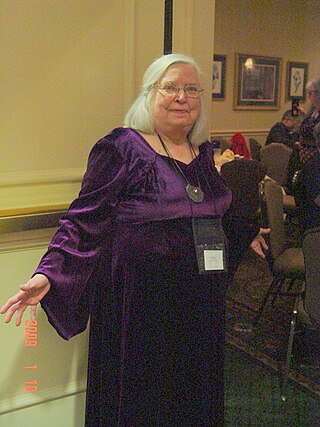
Juanita Ruth Coulson is an American science fiction and fantasy writer most well known for her Children of the Stars books, published from 1981 to 1989. She was a longtime editor of the science fiction fanzine Yandro.
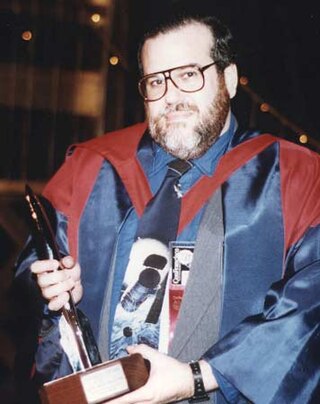
Andrew Ian Porter is an American editor, publisher and active science fiction fan.
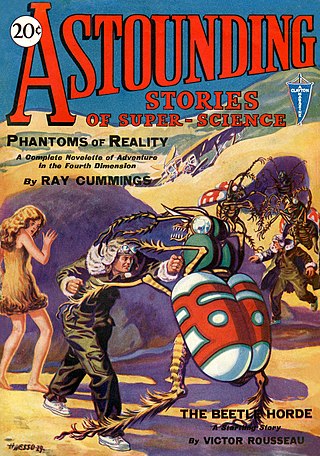
Analog Science Fiction and Fact is an American science fiction magazine published under various titles since 1930. Originally titled Astounding Stories of Super-Science, the first issue was dated January 1930, published by William Clayton, and edited by Harry Bates. Clayton went bankrupt in 1933 and the magazine was sold to Street & Smith. The new editor was F. Orlin Tremaine, who soon made Astounding the leading magazine in the nascent pulp science fiction field, publishing well-regarded stories such as Jack Williamson's Legion of Space and John W. Campbell's "Twilight". At the end of 1937, Campbell took over editorial duties under Tremaine's supervision, and the following year Tremaine was let go, giving Campbell more independence. Over the next few years Campbell published many stories that became classics in the field, including Isaac Asimov's Foundation series, A. E. van Vogt's Slan, and several novels and stories by Robert A. Heinlein. The period beginning with Campbell's editorship is often referred to as the Golden Age of Science Fiction.

Satellite Science Fiction was an American science-fiction magazine published from October 1956 to April 1959 by Leo Margulies' Renown Publications. Initially, Satellite was digest-sized and ran a full-length novel in each issue with a handful of short stories accompanying it. The policy was intended to help it compete against paperbacks, which were taking a growing share of the market. Sam Merwin edited the first two issues; Margulies took over when Merwin left, and then hired Frank Belknap Long for the February 1959 issue. That issue saw the format change to letter size, in the hope that the magazine would be more prominent on newsstands. The experiment was a failure and Margulies closed the magazine when the sales figures came in.
Science Fiction Chronicle was an American science fiction magazine published from 1979 to 2006. It was named Science Fiction Chronicle until 2002 and from then until 2006, just Chronicle.
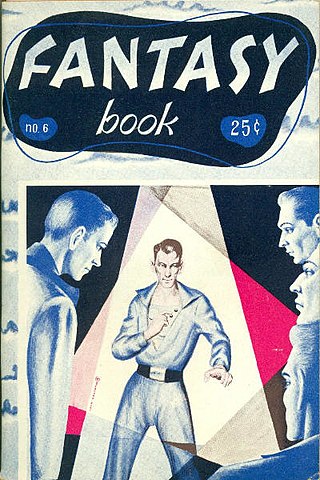
Fantasy Book was a semi-professional American science fiction magazine that published eight issues between 1947 and 1951. The editor was William Crawford, and the publisher was Crawford's Fantasy Publishing Company, Inc. Crawford had problems distributing the magazine, and his budget limited the quality of the paper he could afford and the artwork he was able to buy, but he attracted submissions from some well-known writers, including Isaac Asimov, Frederik Pohl, A. E. van Vogt, Robert Bloch, and L. Ron Hubbard. The best-known story to appear in the magazine was Cordwainer Smith's first sale, "Scanners Live in Vain", which was later included in the first Science Fiction Hall of Fame anthology, and is now regarded as one of Smith's finest works. Jack Gaughan, later an award-winning science fiction artist, made his first professional sale to Fantasy Book, for the cover illustrating Smith's story.

Futuria Fantasia was an American science fiction fanzine created by Ray Bradbury in 1938, when he was 18 years old. Though only four issues of the fanzine were published, its list of contributors included Hannes Bok, Forrest J. Ackerman, Henry Kuttner, Damon Knight, and Robert A. Heinlein.
References
- ↑ "Algol: A Magazine About Science Fiction No. 26". Parigi Books. Retrieved 7 August 2020.
- ↑ Ashley, Michael (2007). Gateways to forever: the story of the science-fiction magazines from 1970 to 1980 Volume 3. Liverpool University Press. p. xix. ISBN 978-1-84631-002-7.
- ↑ "SFE: Science Fiction Chronicle". sf-encyclopedia.com. Retrieved 2024-12-02.
- 1 2 "SFE: Algol". sf-encyclopedia.com. Retrieved 2024-12-02.
- ↑ "1974 Hugo Awards". World Science Fiction Society. Archived from the original on 3 March 2012. Retrieved 8 July 2010.
- ↑ "The Best Fanzine Hugo Nominees and Winners". Harvia, Teddy. Hugos At A Glance website